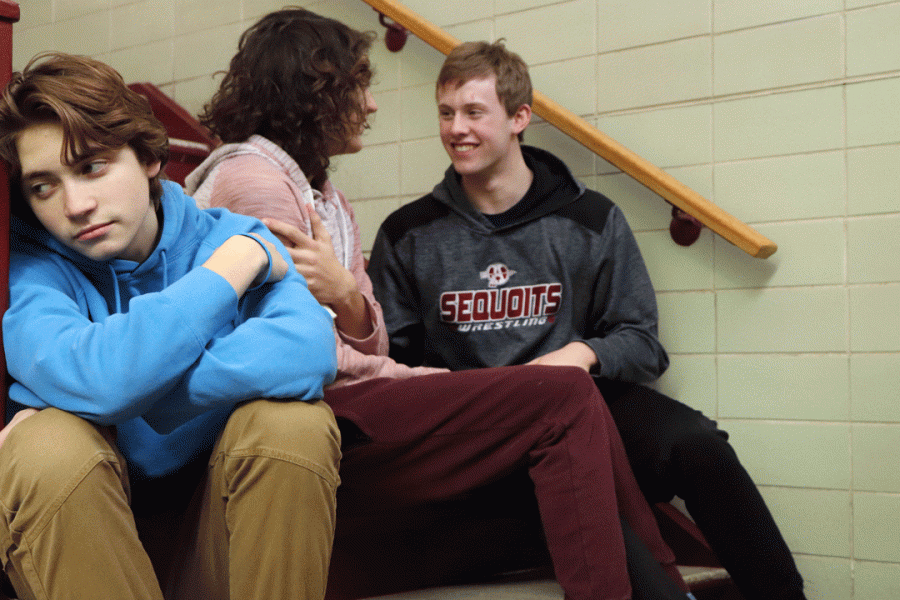Alone Together
The feeling of isolation can find you even in a crowd of your closest friends.
Being in a social environment does not necessarily mean they are feeling social. Being put into a social situation at some times may feel as being completely left alone. “Although they do treat me like I belong in their group, sometimes it feels a little secluded because they’ve all been so close longer than I’ve been a part of their group,” sophomore Erika Mehring said.
It’s the little things; the tiny, thoughtless motions people make and actions people take that have the capacity to make someone feel isolated. It does not have to be deliberately malicious to have an impact. It’s as simple as not responding to a “hello” in the hallway; it’s talking over someone or failing to engage them in conversation; it’s talking about a movie that everyone except one person has seen; it’s not including someone in an inside joke. It’s the little things that, to someone who feels set apart from their closest friends, can be as painful as a punch to the gut.
When people think of social isolation, it is typically defined as the complete absence of human interaction, but loneliness can still be present even when a person has a complex network of relationships. When someone feels that they are deprived of human connection, it may have a devastating impact on their mental health. Social studies department chair Jaclyn Orlov spoke on the impact of social isolation on the human psyche.
“Humans are naturally social animals, so depriving us of socialization causes us to have an impact on our view of self, on our view of others and a variety of things socially and emotionally,” Orlov said. “A lot of symptoms can develop from feeling like you’re isolated from social interactions with peers. Things like depression, anxiety, fear and irrational fears.”
Orlov went on to describe how these effects can be amplified when the source of the isolation comes from the people to whom the lonely person is closest.
“[Social isolation] is more damaging when people feel isolated from their friends because their friends are people they view as allies,” Orlov said. “So if they feel isolated from their allies, sometimes there’s nowhere else to turn.”
The nature of the connections within a friend group is just as important as having them in the first place. Some people are content with having many acquaintances; others require deeper connections that allow them to reveal their true selves. If a group has both types of people within it, this can become a source of isolation for the person who needs that deeper relationship. Sophomore Elijah Ruano opened up about his relationship with his group of friends.
“I care a lot about each and every one of my friends and I know they care about me too, but it’s kind of hard to remember that sometimes,” Ruano said. “I’ll treat them with a lot of care, and then sometimes I don’t get that back. It just might just be my head, but that’s how I feel.”
People who require those closer connections with others who also have friends that do not need that same attention can sometimes feel like their friends don’t care about them. It can make them feel as though they are in a one-sided friendship. Even if he doesn’t always get it in return, Ruano–as well as many other people–just wants to give love to others.
“I want to be the guy who cares about everyone so much, even if they don’t in return,” Ruano said. “People may hate me and I’ll still try to be friends with them. That’s just who I want to be.”
Isolation can still occur when the give and take of affection between friends is mutual. For some, timing is everything. A lot of friend groups have been together for years, so for a newcomer feeling included can be difficult even if the group treats them well. Such is the case for sophomore Erika Mehring.
“I have a group of friends that they have all been close since middle school,” Mehring said. “Although they do treat me like I belong in their group, sometimes it feels a little secluded because they’ve all been so close longer than I’ve been a part of their group.”
Established groups of friends can have history that is inaccessible to a newer friend. The newcomer can feel like they’re intruding or barging in on something that they are not supposed to be a part of. Mehring went on to describe how she handles these feelings and other conflicts within her friend group.
“Over the past couple of years, I’ve become a lot more aggressive and honest with people,” Mehring said. “I used to bottle up feelings and then not talk to people about it, but now if some situation is happening, my friends know that I will call them out. It’s not necessarily a good thing, but it’s something that I do to cope.”
It doesn’t take a trained psychologist to know that maintaining good relationships with friends and making sure that everyone in a friend group is included is vital to keeping everyone happy and healthy.
“[Inclusion] is extremely important because I think exclusion is one of the most heartbreaking and degrading feelings in the world,” Mehring said. “Seeing your group of friends hanging out and knowing that they didn’t invite you sucks.”
Often just as difficult as coping with the feeling of being isolated is figuring out what to do about it. Trying to communicate and reconcile the conflicts that cause social isolation may be the best way to fix the situation, but simply talking does not always work. Sometimes, the best thing for a person to do is to is to find new things they can connect with.
“I think a good thing to do is find some way to connect to people, and maybe stepping outside of the friend group,” Orlov said. “Sometimes new relationships build new social connections, and that’s enough to fill that void.”



